Related Research Articles
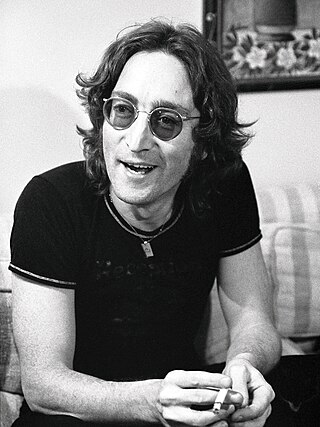
John Winston Ono Lennon was an English singer, songwriter and musician. He gained worldwide fame as the founder, co-lead vocalist and rhythm guitarist of the Beatles. His work included music, writing, drawings and film. His songwriting partnership with Paul McCartney remains the most successful in history as the primary songwriters in the Beatles.

Playboy is an American men's lifestyle and entertainment magazine, formerly in print and currently online. It was founded in Chicago in 1953 by Hugh Hefner and his associates, funded in part by a $1,000 loan from Hefner's mother.

Yoko Ono is a Japanese multimedia artist, singer, songwriter, and peace activist. Her work also encompasses performance art and filmmaking.
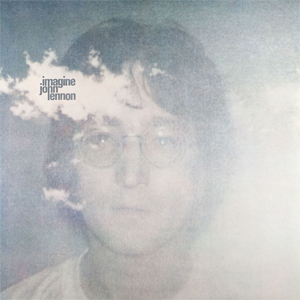
Imagine is the second solo studio album by English musician John Lennon, released on 9 September 1971 by Apple Records. Co-produced by Lennon, his wife Yoko Ono and Phil Spector, the album's elaborate sound contrasts the basic, small-group arrangements of his first album, John Lennon/Plastic Ono Band (1970), while the opening title track is widely considered to be his signature song.

Some Time in New York City is a part-studio, part-live double album by John Lennon and Yoko Ono as Plastic Ono Band that included backing by the American rock band Elephant's Memory. Released in June 1972 in the US and in September 1972 in the UK on Apple Records, it is Lennon's sixth album to be released under his own name, and his fourth with Ono. Like Lennon's previous solo albums, it was co-produced by Lennon, Ono and Phil Spector. The album's agitprop lyrics are politically charged compared to its predecessors, addressing political and social issues and topics such as sexism, incarceration, colonialism, and racism.

Double Fantasy is the fifth studio album by John Lennon and Yoko Ono, and the final one before his death. Released in November 1980 on Geffen Records, the album marked Lennon's return to recording music full-time, following his five-year hiatus to raise his son Sean. Recording sessions took place at the Hit Factory in New York City between August and October 1980. The final album features songs from both Lennon and Ono, largely alternating between the two in its track listing. Other tracks recorded by Lennon from the sessions were compiled by Ono for release on Milk and Honey in 1984.
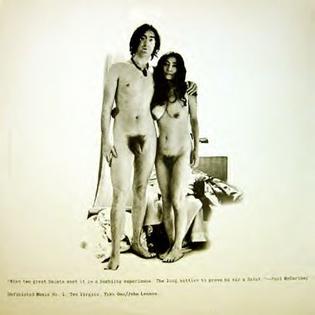
Unfinished Music No. 1: Two Virgins is the first of three experimental albums released by John Lennon and Yoko Ono on Apple Records. It was the result of an all-night session of musical experimentation with Yoko in John's home studio at Kenwood, while his wife, Cynthia Lennon, was on holiday in Greece. Lennon and Ono's 1968 debut recording is known not only for its avant-garde content, but also for its cover, which shows the couple naked. This made the album controversial to both the public and the parent record company EMI, which refused to distribute it. In an attempt to avoid controversy, the LP record was sold in a brown paper bag, and distributed by Track and Tetragrammaton in the United Kingdom and the United States respectively. Two Virgins, while failing to chart in the UK, reached number 124 in the US. The album was followed six months later by Unfinished Music No. 2: Life with the Lions.
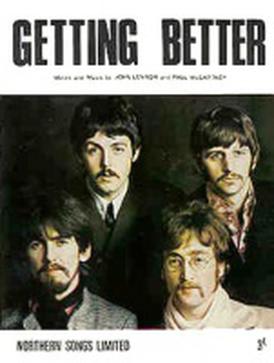
"Getting Better" is a song by the English rock band the Beatles from their 1967 album Sgt. Pepper's Lonely Hearts Club Band. It was written mainly by Paul McCartney, with some of the lyrics written by John Lennon, and credited to the Lennon–McCartney partnership.
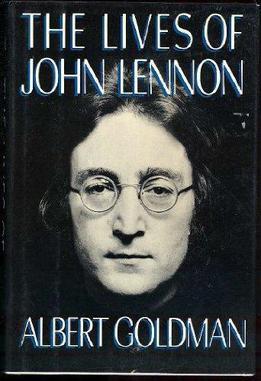
The Lives of John Lennon is a 1988 biography of musician John Lennon by American author Albert Goldman. The book is a product of several years of research and hundreds of interviews with Lennon's friends, acquaintances, servants and musicians. It is best known for its criticism and generally negative representation of the personal lives of Lennon and his wife, Yoko Ono.
"Why Don't We Do It in the Road?" is a song by the English rock band the Beatles, released on their 1968 double album The Beatles. Short and simple, it was written and sung by Paul McCartney, but credited to Lennon–McCartney. At 1:42, "Why Don't We Do It in the Road?" comprises 34 bars of a twelve-bar blues idiom. It begins with three different percussion elements and features McCartney's increasingly raucous vocal repeating a simple lyric with only two different lines.
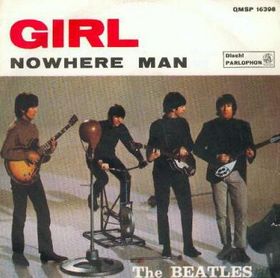
"Girl" is a song by the English rock band the Beatles from their 1965 album Rubber Soul. It was written by John Lennon and credited to Lennon–McCartney. "Girl" was the last complete song recorded for that album. "Girl" is considered to be one of the most melancholic and complex of the Beatles' earlier love songs.

"Tell Me What You See" is a song by the English rock band the Beatles that first appeared in 1965 on their album Help! in the United Kingdom and on Beatles VI in the United States. The song is credited to Lennon–McCartney but mainly written by Paul McCartney. Regarding the song's authorship, McCartney said, "I seem to remember it as mine. I would claim it as a 60–40 but it might have been totally me." John Lennon said, in his interviews with Playboy (1980) and Hit Parader (1972), that "Tell Me What You See" was written completely by McCartney.
"Any Time at All" is a song by the English rock band the Beatles. Credited to the Lennon–McCartney partnership, it was mainly composed by John Lennon, with an instrumental middle eight by Paul McCartney. It first appeared on the Beatles' A Hard Day's Night album.

"Woman" is a song written and performed by English singer John Lennon from his 1980 album Double Fantasy. The track was chosen by Lennon to be the second single released from the Double Fantasy album, and it was the first Lennon single issued after his murder on 8 December 1980. The B-side of the single is Yoko Ono's song "Beautiful Boys".

"That Means a Lot" is a song written mainly by Paul McCartney, and credited to Lennon–McCartney. It was released in 1965 by P.J. Proby. Proby's version reached #24 on the NME chart. Prior to the release by Proby, the Beatles recorded a version that was intended for the Help! film and soundtrack album. The Beatles were dissatisfied with the song and their version was not released until the Anthology 2 CD in 1996.
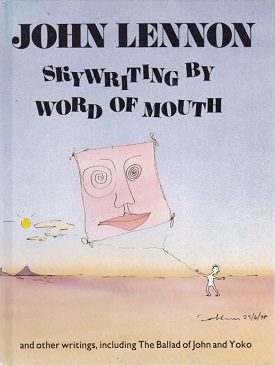
Skywriting by Word of Mouth, and Other Writings Including the Ballad of John and Yoko, is the third, and last, book written by English musician John Lennon. It was published posthumously in 1986 and included an afterword by Lennon's widow, Yoko Ono, whom he married in 1969. Like his other books, it contains miscellaneous writings and cartoons.
David Sheff is an American author of the books Beautiful Boy: A Father's Journey Through His Son's Addiction, Clean: Overcoming Addiction and Ending America's Greatest Tragedy, Game Over, The Buddhist on Death Row and All We Are Saying: The Last Interview with John Lennon and Yoko Ono.

"Imagine" is a song by the English rock musician John Lennon from his 1971 album of the same name. The best-selling single of his solo career, the lyrics encourage listeners to imagine a world of peace, without materialism, without borders separating nations and without religion. Shortly before his death, Lennon said that much of the song's lyrics and content came from his wife, Yoko Ono, and in 2017, she received a co-writing credit.
"I Know (I Know)" is a song written by John Lennon released on his 1973 album Mind Games. The song is included on the 1998 box set John Lennon Anthology and the 2020 compilation album Gimme Some Truth. The Ultimate Mixes.
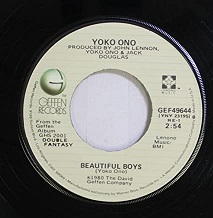
"Beautiful Boys" is a song written by Yoko Ono that was first released on Ono's and John Lennon's 1980 album Double Fantasy. It was later released as the B-side of Lennon's #1 single "Woman."
References
- ↑ Class of 1967. (1967). Yale University - Banner and Pot Pourri Yearbook. New Haven, CT: Produced under the auspices of the 1967 Class Council in cooperation with Yale Banner Publications. p. 63. OCLC 17100540.
{{cite book}}: CS1 maint: numeric names: authors list (link) - 1 2 Deirdre Carmody, "TV Guide Taps Editor to Lead On-Line Unit," The New York Times, June 28, 1995.
- ↑ Sheff, David; Lennon, John; Ono, Yoko; Golson, G. Barry (1983). The Playboy interviews with John Lennon and Yoko Ono. Berkley Books. ISBN 0425059898. OCLC 474949545.
- ↑ Golson, G. Barry (1981). The Playboy interview. Wideview Books. ISBN 0872236447. OCLC 804320637.
- ↑ Sheff, David; Golson, G. Barry (2001). Last interview: all we are saying - John Lennon and Yoko Ono. Pan. ISBN 0330482580. OCLC 47677069.
- ↑ Ulin, David L. (6 September 2012). "Revisiting classic Playboy interviews with e-books". Los Angeles Times .
- ↑ Lavin, Cheryl (14 August 1983). "Q&A". Chicago Tribune .
- ↑ Werts, Diane (14 Apr 1993). "Pages of 'TV Guide' contain the history and heart of television" . The Arizona Republic . p. E4.
- ↑ William Grimes, "Behind The No. 2 Feature In Playboy," The New York Times, September 23, 1992.
- ↑ Carol Krol, "'Yahoo! Internet Life' Finds Real Success In Virtual World," Advertising Age , March 8, 1999.
- ↑ Barry Golson, "The Techno-Terror of 1897," The New York Times, April 8, 1997.
- ↑ Barry Golson, "Clinton and Carter, A Tale of Hope and Lust," Los Angeles Times, November 20, 1992.
- ↑ Salon , June 22, 1997.
- ↑ Golson, Barry (2008). Gringos in paradise: an American couple builds their retirement dream house in a seaside village in Mexico. Scribner. ISBN 978-0743276368. OCLC 276998058.
- ↑ Golson, Barry; Golson, Thia (2008). Retirement Without Borders (1st ed.). New York: Scribner. ISBN 978-0743297011. OCLC 781912346.
- ↑ "The Best In..." . The Wall Street Journal . 18 April 2009.
- ↑ "Guide to Essential Books on Expat Life: From How-Tos and Memoirs to Fiction". The Wall Street Journal . 21 May 2015.
- ↑ Barry Golson in the ‘’Tampa Bay Times’’